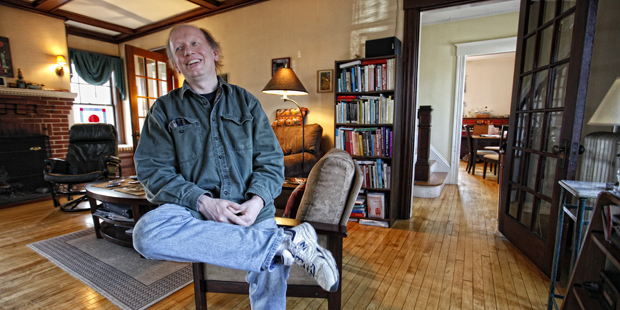Rakowski has always looked for challenges in music
Several of the music professor's pieces to premiere this winter
 Photos/Mike Lovett
Photos/Mike LovettDavid Rakowski at home
David Rakowski has come a long way since tinkering on the perennially out-of-tune piano in his parents’ Vermont home.
This winter, several of his compositions will be recorded or debuted live, making it one of his busier seasons.
Raised on the classical music records his folks bought at the supermarket, Rakowski, the Walter W. Naumburg Professor of Composition, has read music as long as he can remember, thanks to his older sister’s tutelage. But it wasn’t until he saw peers compete for the Vermont All-State Music Festival composition prize that he made his foray into writing music.
“One kid had brought his whole high-school band to play his piece, ‘Soliloquy to a Snowstorm,’” Rakowski still recalls. “I thought, ‘Wow, someone just a little bit older than me wrote for the whole band? And got paid for it? You know, I’m smart. I bet I could do that.’”
The next year, as a high-school junior, he gave it a shot, conducting a band playing his music for the first time. He received an honorable mention. The next year, he won and never looked back. He went on to get an undergraduate degree at the New England Conservatory.
But after four years at Princeton University, where he earned a master’s degree and pursued a doctorate, he spent another “four miserable years” working as a part-time word processor and writing pieces for friends. That’s when a professor who was taking a leave at Stanford University recommended Rakowski as his replacement ⎯ even though Rakowski had not yet finished his dissertation.
“It was the first time in four years I was always thinking about music,” he says. “And thinking about the problem-solving process for other composers, the students, helped me with my own.”
Rakowski finished his dissertation and taught for a while at Columbia University before arriving at Brandeis in 1996 with a considerable amount of composing experience under his belt.
As a young composer, while working on larger pieces that involved much thought and revision, he challenged himself to write piano etudes, with a self-imposed time limit of six days. It was an exercise to write more spontaneously and get his mind off the larger work.
“Over the course of the next five or six years, I wrote five or six of them,” he says. “Some pianists had played them to a good reception, and artists started asking for them.”
Twenty-three years later, Rakowski had completed a total of 100 etudes. “That’s where I stopped,” he says, dryly. “Why have 101 etudes?”
His friend Amy Briggs, who performs with the Chicago Symphony Orchestra’s MusicNOW series, has been recording his etudes. She’ll record a fourth CD of them next year.
Rakowski has also written a 45-minute piano concerto for Briggs, incorporating all her favorite aspects of composition, commissioned by the Boston Modern Orchestra Project with funds from the Jebediah Foundation. She’ll play the piece on Jan. 17 at Boston’s Jordan Hall, then record it several days later.
“I like weird little challenges,” he says, “which is why I asked Amy what she wants in the piece — it’s a challenge putting all those requests into the piece and making it work.”
Even when Rakowski takes a break from music, he applies the same intensity.
“I’m a famous fontmaker,” he says. He created his first font for his dissertation, because he needed one that included musical notation. Later, he created nearly 100 shareware fonts, which he still receives weekly requests for.
“I see my fonts all the time,” he says. “On the show ‘South Park’? That’s my font they use on the blackboards.
His love of challenges pushed Rakowski to write what he considers an exceptionally difficult 30-minute piece that requires 10 clarinet virtuosos, one of the reasons it’s rarely performed. The U.S. Marine Band will take ion “10 of a Kind” Feb. 2.
Next semester, he’ll offer a graduate course in teaching music and a composition seminar. His Brandeis students, he says, keep him thinking of new ways to compose.
“When I think I’ve pretty much heard every idea under the sun,” he says, “then a student brings in something and it’s like, ‘Oh, I hadn’t thought of this before.’”
Composing is a “notoriously late-to-bloom” skill, he warns.
But “if you have ever spent a sleepless night obsessing about one phrase in your piece, then you’re a composer,” he says. “If you can’t imagine doing anything else with your life, then you’re a composer.
“This is starting to sound like redneck jokes,” he concludes with a wry smile.
Categories: Arts





